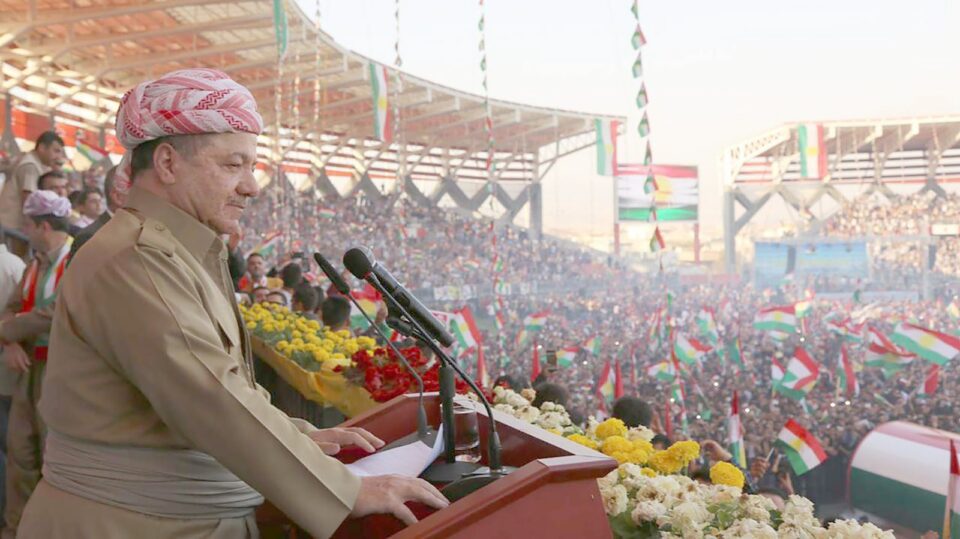The Kurdish people’s referendum marked a turning point in their history, highlighting their democratic and constitutional right to determine their destiny in peace
For the first time in history, the Kurdish people exercised their democratic right to determine their own destiny through a referendum. On June 7, 2017, a day like today seven years ago, a historic decision was made during a meeting of political parties in the Kurdistan Region, led by President Massoud Barzani. This meeting paved the way for the referendum on Kurdistan’s independence, held on September 25, 2017. The result was momentous, as over 92% of the Kurdish people voted in favor of independence, making it a defining moment in the region’s modern history.
Reflecting on the historic day of the decision, President Barzani wrote in a letter, “The meeting of June 7, 2017, was a historic and important achievement for the Kurdish people and the sacrifices of our martyrs. The Kurdish people must convey their voice and will to the world through the referendum.”
He expressed his gratitude to the Peshmerga forces, the proud Kurdish people, and the political parties that stood together with a national and historic sense of responsibility. Barzani added, “This step will lead to national unity and solidarity among the political parties. It is a natural right of the Kurdish people to achieve this through peace and non-violence. We want to maintain the best relations and understanding with Baghdad, our neighbors, and the countries of the region.”
Barzani also emphasized the importance of remembering the sacrifices that brought Kurdistan closer to its achievements, saying, “Our achievements and victories are the product of the blood of our martyrs. Thousands of greetings to the souls of the martyrs on the path to freedom.”
On September 25, 2017, the Kurdistan Regional Government (KRG) held an independence referendum across the Kurdistan Region of Iraq. In the referendum, 3,305,925 people participated, representing more than 92% of the total number of participants. The overwhelming support for independence highlighted the Kurdish people’s deep desire for self-determination.
Hakim Hamdi Gli, a Kurdish politician and national security expert, spoke to *The Kurdish Globe* about the background of the referendum. He noted that the Kurdish people had high hopes for a new Iraq after the liberation process, with the most important goal being the Kurdish-Arab partnership and civil collaboration to build a unified Iraq. “Unfortunately, new politicians, who had once joined the Kurdish struggle against the oppression of the Ba’ath regime, soon adopted the same policies as their failed predecessors,” Gli remarked. He explained that this growing disillusionment with Iraqi politics played a significant role in driving the Kurdish people to hold the referendum.
“There are many reasons why the Kurdish people decided to hold an independence referendum,” Gli continued, “but the main reasons include chauvinism, the rejection of Kurdish identity, and ongoing disputes over salaries and the budget, which the Iraqi government has long used to marginalize the Kurds. It was a legitimate and long-overdue step to allow the Kurdish people to determine their fate after decades of oppression and having their rights repeatedly violated.”
Gli highlighted that throughout history, all Kurdish revolutions have been motivated by the desire for independence, but the conditions had never been right for holding a referendum. After the liberation of the Kurdistan Region and the fall of the Ba’ath regime, Kurds initially accepted federalism within the framework of the Iraqi constitution. However, Gli noted that parties in Iraq and neighboring countries continued to try to weaken the Kurds, leaving the referendum as the only viable option for the Kurds to determine their own fate.
President Barzani’s decision to hold the referendum was a bold and legal step within the framework of the right to self-determination, recognized internationally. The referendum was conducted peacefully and democratically, echoing around the world as a symbol of the Kurdish people’s will for independence.
Sherwan Nasih Haideri, a former Minister of Justice, also reflected on the significance of the referendum in a statement to *The Kurdish Globe*, saying, “The referendum has become the greatest national achievement of the will of a nation, and no one can deny it. The Kurdish nation moved forward with its own will, regardless of differing political ideologies and affiliations. The overwhelming ‘Yes’ vote means that this referendum has become an important historical document, a part of the history of the Kurdish people. It is a right given by God to all peoples and nations to decide their own fate.”
Haideri also recalled the first meeting with religious scholars in Kurdistan on August 9, 2017, when President Barzani sought their views on the referendum. “For the scholars, this was a legitimate right, and there was no problem in moving forward with the referendum,” Haideri added.
He explained that the reasons the Kurdish people decided to hold a referendum included violations of the three fundamental principles of partnership, balance, and compromise in Iraq after the fall of Saddam Hussein’s regime, as well as repeated violations of the Iraqi constitution, particularly Article 140. The Baghdad government’s continued oppressive policies and its refusal to send the salaries of Kurdish employees under various pretexts were clear examples of why a referendum was necessary.
With pride, Haideri noted that President Barzani conducted the referendum on time, standing firm in his decision despite opposition. “As Kurds and Kurdistanis, it is our greatest achievement and source of pride that we voted for independence,” he stated.
Additionally, Haideri emphasized the lasting impact of the referendum: “The referendum is a sun that will never set. Its achievements are the outcome of the struggle and dedication of the late Barzani, President Barzani, the heroic Peshmerga forces, and the Kurdish people as a whole.”
The Kurdish Globe

